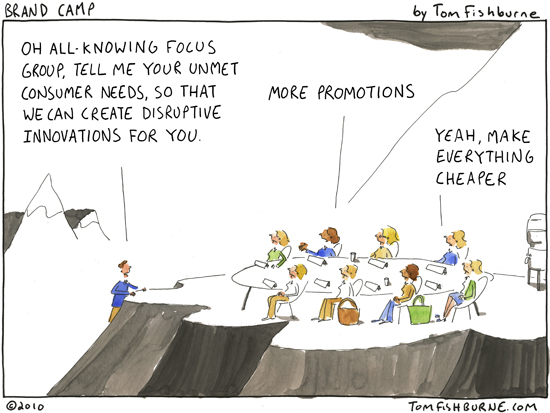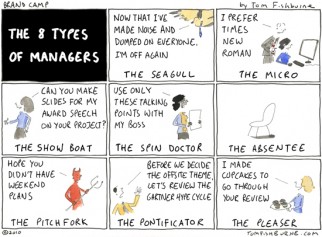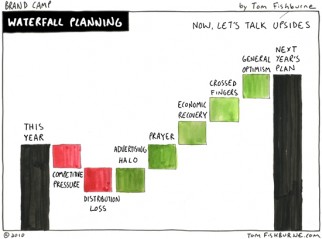Henry Ford famously said, “if I’d asked customers what they wanted, they would have said ‘a faster horse'”.
Many businesses treat focus groups as prophetic. Whether looking for inspiration or validation, they give staggering authority to eight strangers gathered on the other side of a one-way mirror. After one particularly idea-sapping focus group, a creative director leaned over to me and said, “do you think these eight women realize how much power they have?” We jokingly referred to them as the Oracles of Eden Prairie.
Focus groups have their place in the field of consumer insights. Yet they are poorly equipped to answer many questions, particularly involving innovations that are dramatically different from what has been done before. It’s rare that remarkable or unique business ideas originate in an eight-member focus group. Most consumers don’t really know what they want, and if they do, they have a difficult time articulating it.
HBS professor Gerald Zaltman first opened my eyes to the power of a non-focus group approach in consumer research. He created a process called the Zaltman Metaphor Elicitation Technique (ZMET) to unearth consumer insights that are deeper than consumers know how to articulate themselves. We experimented with these techniques in the classroom. Dan Pink wrote a great profile on Zaltman that captures the value of this approach:
“People can give us only what we give them the opportunity to provide,” Zaltman says. “To the extent that we structure the stimulus – whether it’s a discussion guide in a focus group or a question in a survey – all people can do is respond. And there’s value in that. But I see those as strip-mining techniques. Sometimes the valuable ore is on the surface. But often it’s not. Strip-mining techniques are inappropriate when there’s a great deal more depth to be had. Typically, the deeper you go, the more value there is.”
Asking the Oracles of Eden Prairie to tell you what they want is a good technique if you’re in the “faster horse” business. But, if you’re trying to create something meaningfully different, experiment with research methods that are also meaningfully different.



Rimalovski says
Excellent!
twitter.com/tedlsimon says
Right on, Tom! Innovation springs from what I like to call “the intersection of what CAN be.” It’s that place where consumer attitudes/behaviors/desires meet technical capabilities…and the collision creates the “idea.”
I’m a big believer in seeking consumer insights, and I even believe focus groups have their place. But, time and again, I’ve seen the difficulty people have in grasping or communicating about ideas or products that are outside their existing realm of experience.
Think of all the innovations we enjoy today that would never have emerged from a focus group: from gadgets like the iPod and cell phones, to every day items like velcro and Post-it notes…it’s a long list.
While Edison’s formula for success equates to “10% inspiration, 90% perspiration,” there IS still a need for that bit of inspiration to truly innovate. And, no group of 8 people can hand you that on a platter.
Thanks for the stimulating post!
Ted
@tedlsimon
John Williamson says
One way to mix things up, particuarly in the area of innovations research, is to deploy alternative methods. Ours leverages webcams, and allows consumers to respond to stimuli and questions via video, on their own time and in settings of their choosing. Often, this means the setting in which they actually interact with the product – and because it’s video, you can see what they do as well as what they say.
We did a recent innovations project for a major communications carrier, and I recall one session where a participant, sitting at his desk alone one night at home, held up his phone and said, “See this? Well it saved my life on night here at this desk. That’s what my mobile phone means to me…” Cutting edge insight? Perhaps no, but he went on to carefully describe an incident in his life, and the role his phone played in that experience. The session was fascinating, and provided a great ideation session with the client afterwards.
Just something to think about, thanks for a good post.
Alex Villeneuve says
Wholeheartedly agree.
roclafamilia says
Helpful blog, bookmarked the website with hopes to read more!
Cristina Quiñones says
I fully agree. Focus Groups are not (always) the answer. It is only a good technique that need to be refocused in the aim to get more depth. I believe more in insights groups than focus groups. We need more insights than penetrate the surface of consumers mind than data or statistics. We need to digg more and better into consumers deep feelings, beliefs and behavior. Excelent post. Congrats! Cristina(www.consumer-insights.blogspot.com).
Tessa Stuart says
I think you need a combination of approaches to get innovation. Innocent Drinks, whom I have worked with, listen to their customers’ freely given comments via social media, look at trade data for growing markets, and explore categories where products can be “made over” and made better. Their original success in building an entire new category of smoothies came from originating a product they themselves wanted that didn’t exist.